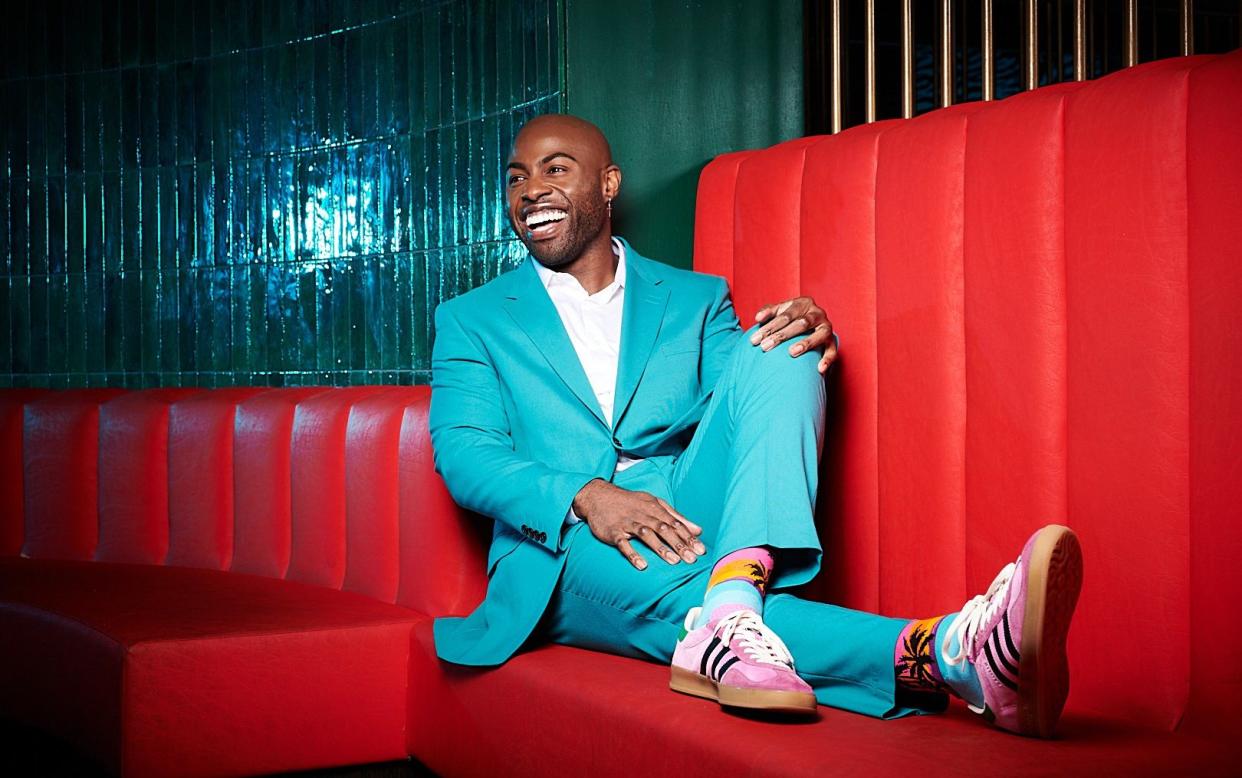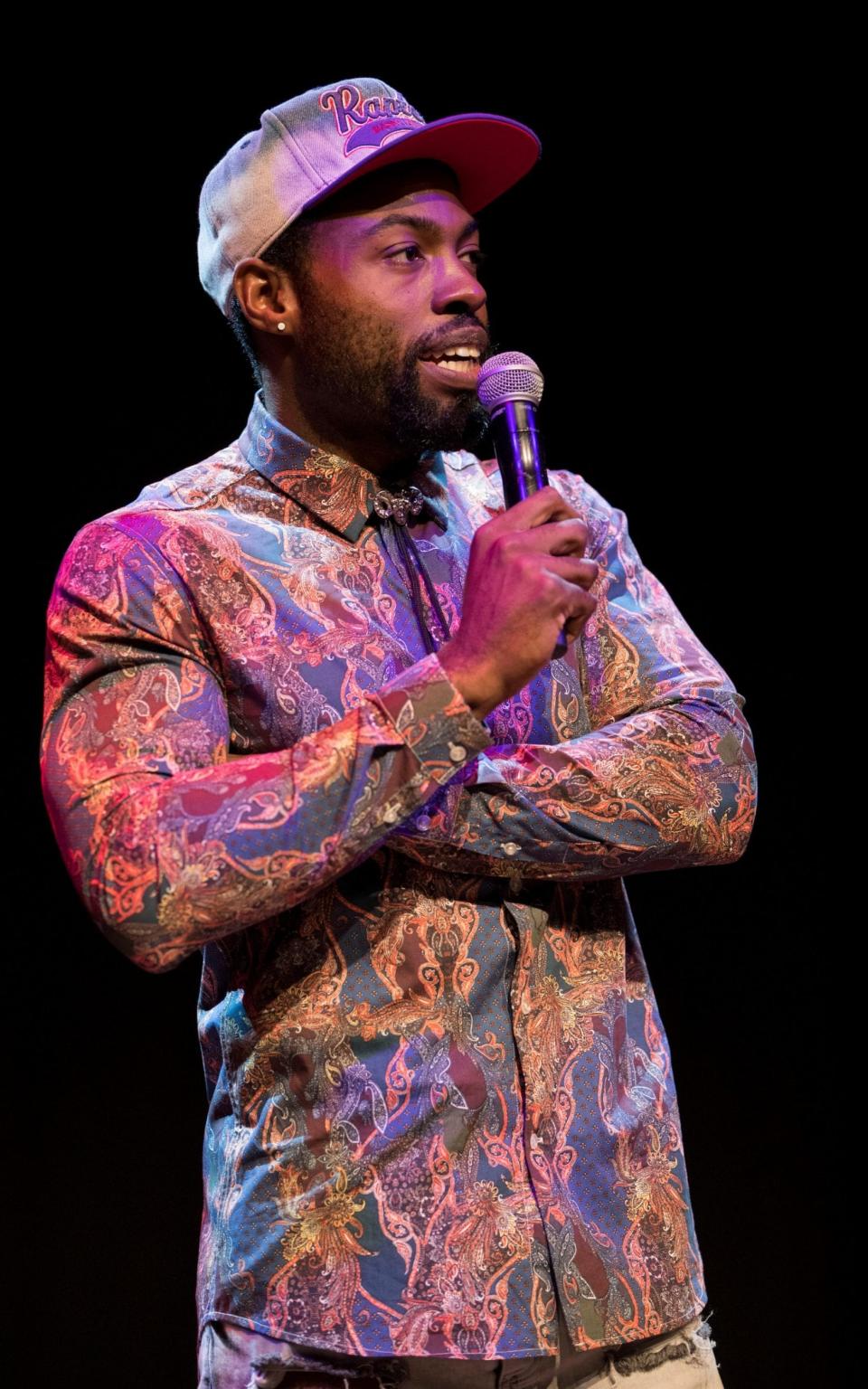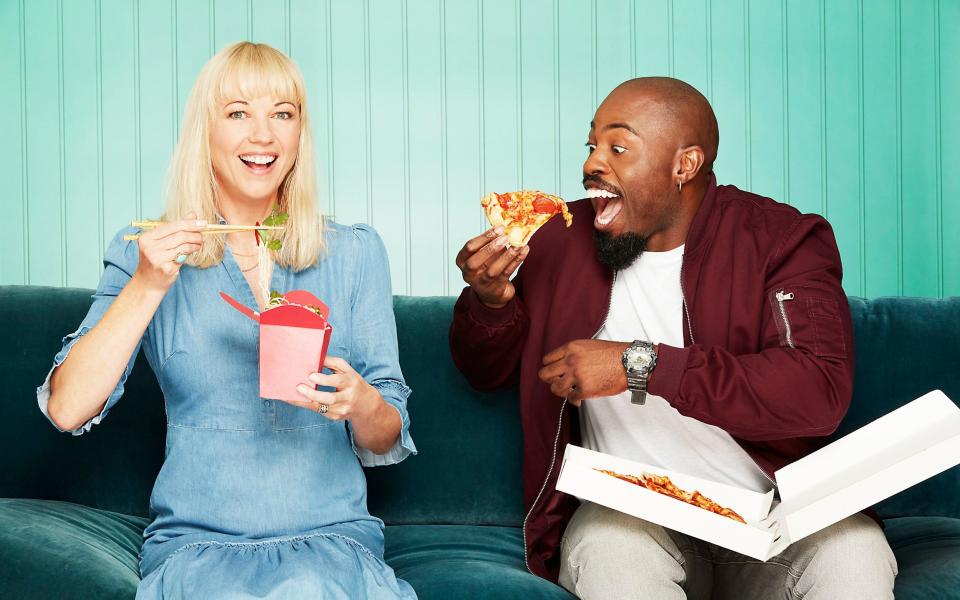Dancing on Ice’s Darren Harriott: ‘I could have killed somebody – or been killed’

Darren Harriott is feeling the bruises. The Brummie stand-up is more used to the comedy circuit than the ice rink: he’s twice been nominated at the Edinburgh Fringe, appeared on Live at the Apollo, and had his own Radio 4 series. But in the month and a half before we meet, he’s been in intensive training for the new series of Dancing on Ice. “This is how bad the falling has got,” the 34-year-old tells me. “I fell about two days ago on my left side and I went, ‘Ooh, that’s nice.’ Because I’ve fallen on my right side so much that my right hip, you can just lightly tap it and I’ll go, ‘Ow!’ – so to fall on my left was like, ‘Oh, this is refreshing.’”
We’re at a members’ club in Soho. Harriott has come straight from the rink, where he has been preparing to join the likes of former EastEnders star Patsy Palmer, ex-footballer John Fashanu and Love Island winner Ekin-Su Cülcüloğlu in the popular ITV1 show, which returns in January. He’s taking it very seriously. “I’ve had relationships with less commitment,” he laughs. He needs size-14 skates, though, meaning that up to now he’s had to train in ice hockey skates. “They don’t make figure skates for people with massive feet,” he moans. A pair specially made for him has just arrived but, he laments, “I’m about six weeks behind in learning how to use them. I’ve got a chip on my shoulder about that. I really want to be good, man.”
He’s buoyant and garrulous, and he bursts to life when talking about comedy. He can be playfully funny about political correctness: “I’ve noticed in TV shows, whenever there’s a scary gang, they’re never all black; they’re very inclusive, aren’t they?” he joked on his Radio 4 show. “There’s like an Asian lady, a white guy, leader’s in a wheelchair.” His own experience of gang culture has been gained the hard way.
Born in working-class Oldbury in the West Midlands, the birthplace of Frank Skinner and three miles from where Lenny Henry grew up in Dudley, Harriott knows that his life could have taken a very different course. He and his brother were brought up by his mother at a time when rival drug gangs were terrorising Birmingham, and his childhood was marked by the trauma of his father’s death by suicide in prison. “My dad was always a mysterious figure,” he tells me. “I would see him every now and again. And it was always a great time. I didn’t know that he was in and out of prison. Every time I’d see him, he’d be in a new car, have wads of cash... I had no idea that my dad was a criminal.”
He remembers his father calling him on the phone around Christmas 1999. “I was so happy to hear from him. And there was so much finality about the chat, it was, you know, ‘Be good at school’ and all that sort of stuff. And I was like, ‘Dad, when am I gonna see you?’ ‘You’ll see me soon. Don’t worry.’”

Afterwards, he tried to find the number using 1471 but got an unexpected message. “That was when I realised my dad was in prison for the first time. I was 11. And then three months later, he hanged himself. It was devastating.
“I have only amazing memories of him. I know that he wasn’t exactly the greatest guy. I know that for sure. But my mum would never say that to us. He was a drug dealer.”
His death precipitated Harriott himself getting involved in a dangerous lifestyle. “I was a sort of lost kid,” he recalls. “I was the fat kid with the braces, who was very lost and angry.” He and a group of about eight boys, mostly from his school, formed a gang. “It was weird because all of us just didn’t have dads. It was the one thing we didn’t talk about. We’d hang out and talk about girls and drugs and grime music. We never spoke about dads. I knew – ‘You’ve never met your dad, your dad’s a drug addict, my dad’s dead, your dad’s in prison.’ Mums would get mentioned because we all lived with our mums. All my friends who had dads,” he notes, “they had nothing to do with the gang.”
He recalls an incident when another group of boys pulled up on bikes and one of them pulled out a huge, serrated “zombie” knife – he remembers the feeling that “we couldn’t do anything”. They punched one of his friends to the floor with a knuckleduster. “I remember me and my friend trying to carry my concussed, dazed, bloody friend to my nan’s, and he could barely walk. I had a white T-shirt on, and it was covered in the blood of my friend. And then from that moment, we started carrying knives and weapons at school.”

He remembers buying a knife at the local newsagents. “I picked a red one to match my jacket at the time. When I carried a knife, if somebody had attacked me, or my friend, I would 100 per cent have stabbed them. If somebody punched me in the face when I was 15, and I had a knife… it would have crossed my mind afterwards, ‘Oh, that was bad’… but I would have definitely done it.
“When I watch the news or read the newspapers and I see 14- or 15-year-old kids...” He trails off, as emotion grips him, thinking of all the teenagers who die from knife crime. “It just breaks my heart every time because it takes me right back. I could have been one of those kids who killed somebody or was killed.”
He was aware of the tightrope he was walking. “I never liked the idea of intimidating people. Even when I carried a knife, I knew the difference between right and wrong, for sure. Being in this gang, as much as it felt good to me, I knew that I was gonna go down the wrong path.” It all came to an end when the gang turned on him. “We had a falling out over music, something small – it never took much back then, and they beat me up.
“I was in hospital on New Year’s Eve 2004. I had lumps on my head and a bloody nose and lip, and my cheek was out and all that sort of stuff. Nothing broken. But I’ll tell you, spending New Year’s Eve in a hospital bed, that really changes your life decisions...”
He set his sights on becoming a comedian, doing his first stand-up gig when he was 18. After a decade of performing in clubs, his cheeky charm saw him nominated for Best Newcomer at Edinburgh in 2017.
Two years later, he was up for the main award. He learned a lot in those early years about how comedy brings people together. “I never went to college, but I was going on the road with doctors, lawyers, teachers, thinking, ‘You’re coming with me on a four-hour round trip to Brighton to do 10 minutes for no money?’ It creates this very strong bond.” He is a firm believer in the right of comedians to make jokes about whatever they choose, even when their views don’t accord with his own. “Everybody else is against us. We should all stick together.” I mention Ricky Gervais: “So many comedians cannot stand it because Ricky Gervais is everything that a lot of these comedians hate. A super-rich white guy who doesn’t care. And he does jokes about people that he doesn’t care about. Well, that’s what they believe... He’s just doing jokes, being a comedian, that’s all... If I heard every comedian do the same kind of jokes, comedy would be terrible.”
Nearly two decades on, Harriott looks back on his escape from thug life with relief, even though it means getting bruises in a different way. “At this point in my life, I would say I am a full-time skater who occasionally dabbles in comedy,” he grins.
Dancing on Ice starts on ITV1 in January. Darren Harriott is on tour from Sept 13 2023; darrenharriott.com

 Yahoo News
Yahoo News 
